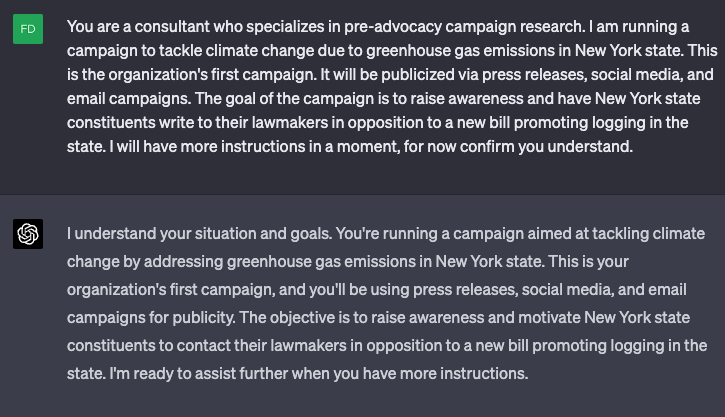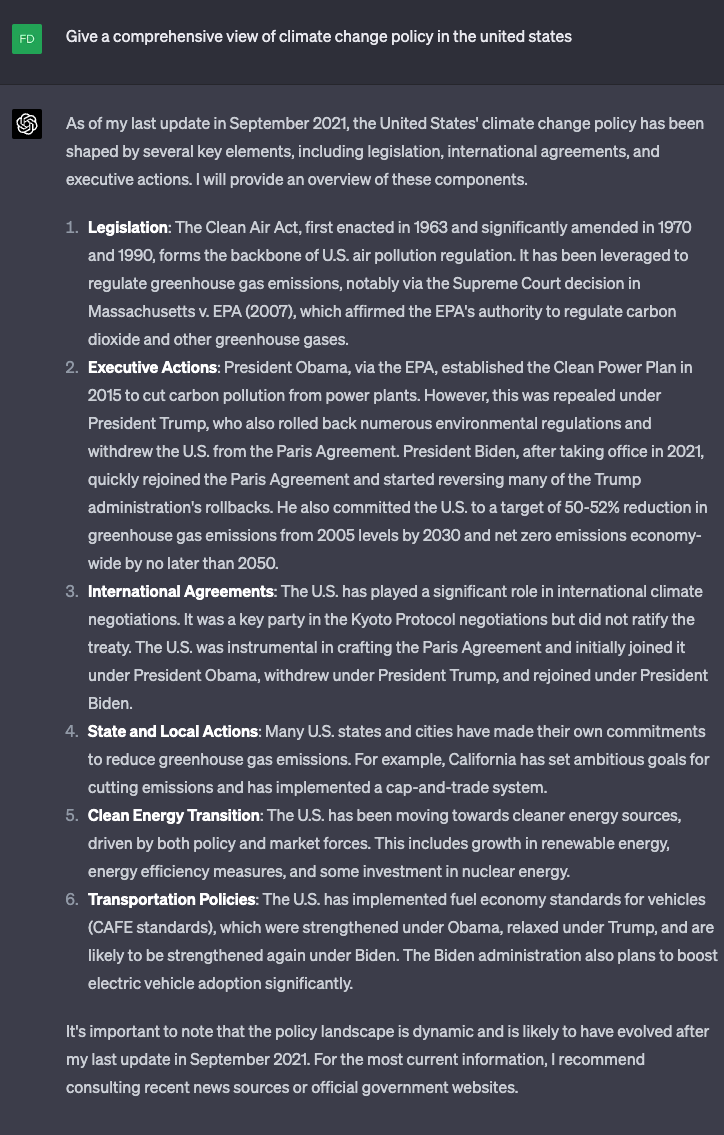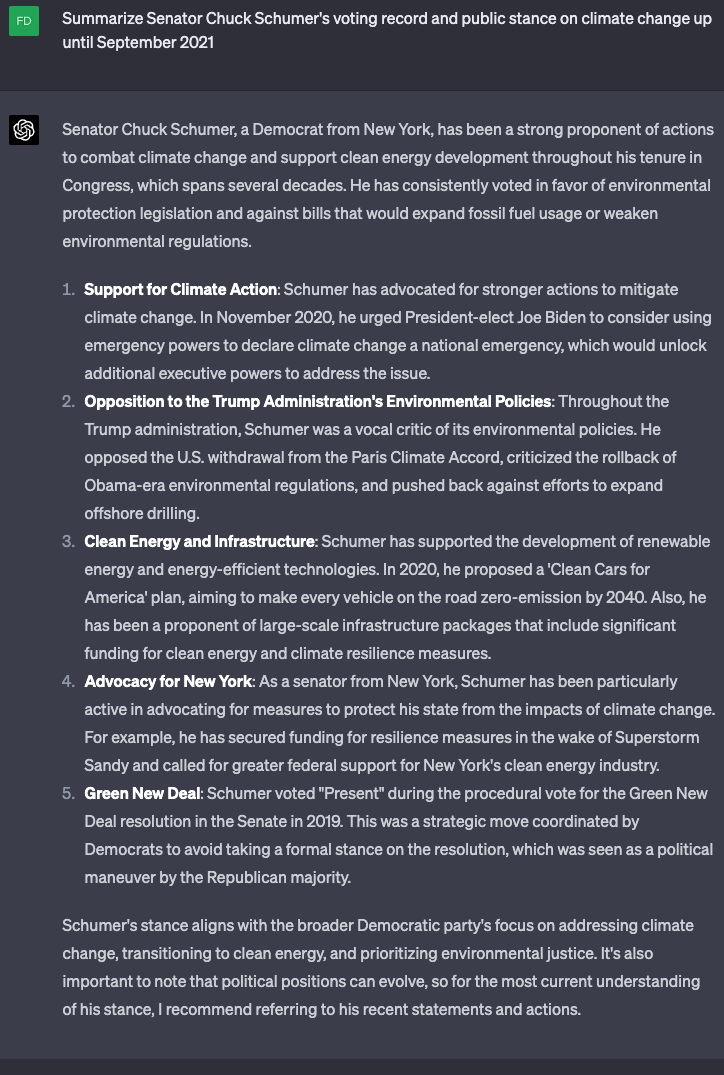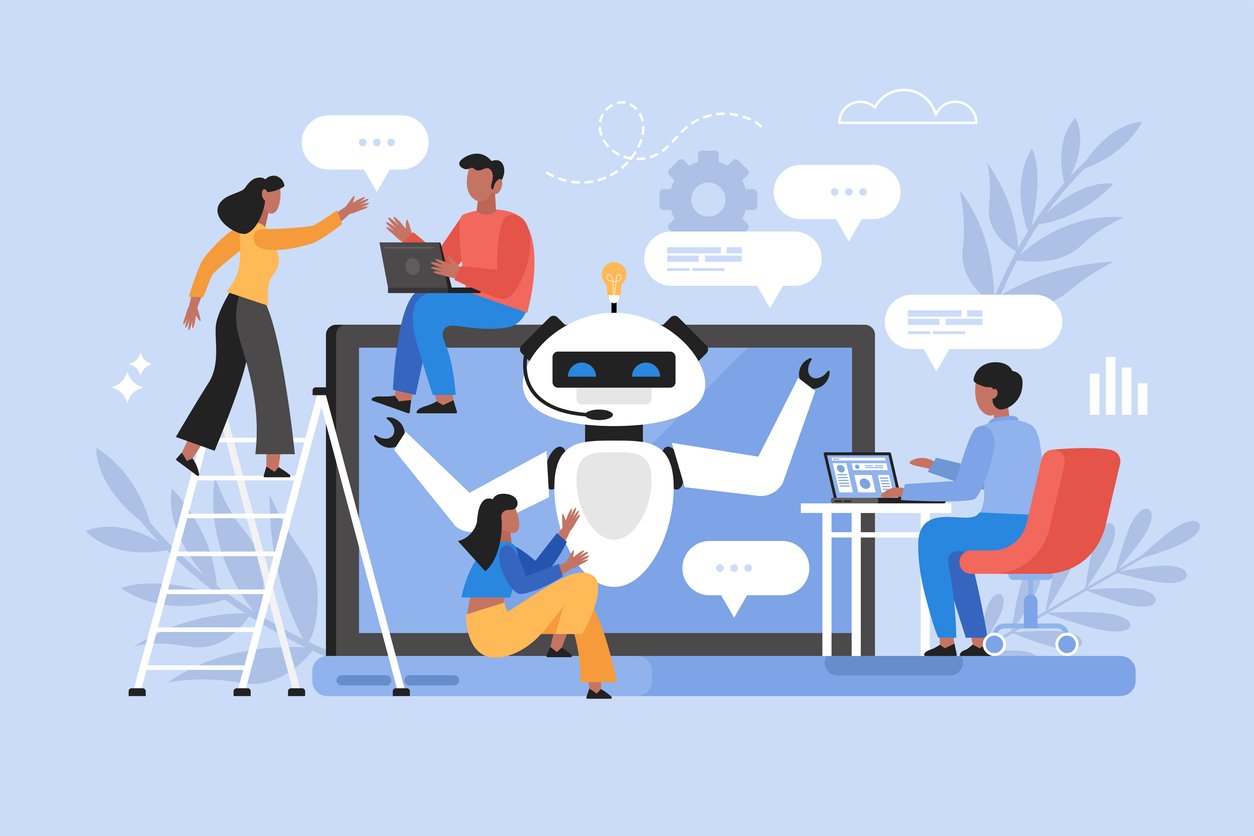In the previous guide in this series you learned the fundamentals of working with AI and ChatGPT: how to craft a great prompt, how to refine it, and how to build a workflow for creating a piece of pillar content from outline to a final product. In this guide we'll turn from "how" to "what" and explore how ChatGPT can help an advocacy campaign beyond creating content.
By the end of the guide you'll know how to use AI to facilitate your research, planning, communication strategy, and data analysis. Let's dive right in!
Research & Data Gathering with AI
Embarking on an advocacy campaign requires thorough research to lay a solid foundation for your strategy. ChatGPT can be your go-to AI assistant in this crucial phase. If you're using ChatGPT for the prompts in this section, it can be useful to initiate the conversation with a context-setting prompt. As you learned in the previous guide, to create an effective prompt you should provide a role, explain the campaign you're hoping to run with as much information as possible, and then ask the AI to confirm it understands.
Example initial prompt: You are a consultant who specializes in pre-advocacy campaign research. I am running a campaign to tackle climate change due to greenhouse gas emissions in New York state. This is the organization's first campaign. It will be publicized via press releases, social media, and email campaigns. The goal of the campaign is to raise awareness and have New York state constituents write to their lawmakers in opposition to a new bill promoting logging in the state. I will have more instructions in a moment, for now confirm you understand.

Topic Exploration
ChatGPT can aide greatly in topic exploration, providing everything from general overviews to intricate details. For instance, if you're tackling climate change, the next prompt in the conversation can be:
Give a comprehensive overview of the current state of climate change policy in the united states.

You can always explore further with follow-up prompts, for example you could ask about background on policies or political movement in a specific local area.
As you see in the reply to the prompt above however, ChatGPT's data is only current up to September 2021. This will become a recurring theme in this article. To get around it the best moves are to use Bing's AI, which is actually ChatGPT but with the capability of web search, or Google's Bard which can also search the web before answering. The ability to search the web is also coming to ChatGPT soon.
Understanding Lawmaker Voting History
Knowing lawmakers' stances on your issue is essential in advocacy. Although ChatGPT's data isn't real-time, it covers information up until September 2021.
To understand a legislator's voting record on climate change, use a prompt like: "Summarize Senator X's voting record and public stance on climate change up until September 2021."
Summarize Senator Chuck Schumer's voting record and public stance on climate change up until September 2021

This prompt works well since it requests not only the voting record but also the public stance, offering deeper insight into the legislator's views. You can always refine your prompts based on responses! Don't hesitate to ask ChatGPT for elaboration or clarification.
Important: ChatGPT offers valuable information, but always validate and supplement AI-generated data with up-to-date research from reliable sources.
AI-Driven Campaign Planning & Strategy
Transitioning from research to planning, ChatGPT remains an invaluable tool. It can generate insightful content to help establish goals, craft timelines, and more.
Establishing Goals and Objectives
Clear, measurable goals are the cornerstone of a successful campaign. Use ChatGPT to guide you through this process with a prompt like: "What are some SMART (Specific, Measurable, Achievable, Relevant, Time-bound) goals for a campaign advocating for climate change policy reform?" This prompt is designed to yield actionable and measurable goals.
Drafting a Campaign Timeline
Managing your campaign effectively requires a comprehensive timeline. ChatGPT can create a blueprint. Try a prompt such as: "Outline a 12-month timeline for a campaign focused on climate change policy reform. In a well-formatted markdown chart" This short, but time-bound prompt leads ChatGPT to produce a high-level overview for a campaign. Follow up with questions asking for the details about each much to drill in deeper.
Identifying Allies and Opponents
Knowing your allies and opponents can significantly shape your campaign strategy. A prompt such as: "Who are likely allies and opponents in a campaign focused on climate change policy reform?" provides valuable insights by exploring both sides of the campaign landscape. But don't forget its data only goes up to 2021!
Remember, while ChatGPT is a potent tool, always complement the AI-generated information with your own expertise and additional research. Used judiciously, ChatGPT can be a priceless asset in crafting a compelling and effective advocacy campaign.
AI for Collaborations & Partnerships
Boosting your campaign's reach and impact is all about forming the right alliances. With ChatGPT, you can tap into its vast sea of data from the internet to pinpoint potential collaborators and even plan out campaign events.
Sourcing Potential Partners
Imagine having a list of organizations tailored to your campaign's objectives right at your fingertips. With a well-crafted prompt like, "ChatGPT, who would be keen on partnering for a climate change policy reform campaign?" you're on your way. Remember, this is a starting point—always double-check to ensure these organizations truly align with your mission.
Event Planning with AI
As far as events go ChatGPT won't make people show up, but can help you map out your campaign event, brainstorm activities, and even chalk out a timeline. A prompt as simple as: "Help me chart out a virtual rally for climate change policy reform" can yield a good high-level response. The specificity of the event type and cause will help ChatGPT generate useful responses.
This is all to say, ChatGPT and AI tools are not a replacement for personal connections and an in-depth understanding of your campaign's nuances. Think of it more like a very advanced Google search, helping you find the information from articles online instantly.
AI for Ad Strategy
Ads—the lifeblood of getting your campaign message out there and swaying public opinion. Although ChatGPT may not be able to directly handle your ad buys or crunch real-time market data, it can serve up insightful suggestions to help shape your ad game plan.
Strategizing Your Ads
Need a hand in piecing together an effective ad strategy? ChatGPT's got you covered. Try asking it, "Jot down the key elements of a solid ad strategy for a climate change policy reform campaign." The prompt's focus on a specific campaign type allows the AI to churn out strategic advice that's on point.
Getting estimates on ad value for different topics
While real-time ad cost estimates are out of ChatGPT's wheelhouse, it can give you a ballpark idea of the factors that might sway ad costs for specific topics based on historical data. For instance, you could prompt it with, "What usually affects the cost of online ads for climate change-related topics?" This kind of prompt can give you a bird's eye view of your operating landscape.
Bear in mind, ChatGPT’s data only runs until September 2021, so always cross-check any info with up-to-date market research and industry expertise.
By weaving AI into your ad strategy, you gain access to invaluable insights. By framing the right questions, you can tap into ChatGPT’s vast knowledge to craft creative, impactful ad strategies for your campaign. As always, the AI’s input is a springboard—refine its suggestions based on your specific context and latest market research.
AI Limitations in Research and Planning
While powerful, ChatGPT does have limitations as of its last update in September 2021:
- It can't provide real-time updates or alerts for specific issues or individuals.
- It can't generate accurate quotes from specific legislators post-September 2021.
- It can't aggregate posts from multiple social media sources.
- It can't track real-time legislative developments.
- It can't provide current voting records for legislators post-September 2021.
- It can't identify individuals who've shared posts on a specific topic.
At its core, ChatGPT isn't a real-time tool, nor is it able to access or analyze specific documents or data points from its training set. Quotes generated by the model are very often made up, and require independent verification. For current legislative developments and voting records, you'll need to rely on specialized tracking tools or services.
Understanding these boundaries allows you to utilize the tool effectively and responsibly. Remember to verify AI-generated information and supplement it with current research and professional expertise.
Conclusion
AI technologies like ChatGPT can be powerful allies in advocacy campaign orchestration, from research to planning and strategizing. While they contribute valuable insights, they don't substitute the need for human discernment or real-time data.
As we conclude our journey into AI's role in strategic planning, anticipate the upcoming guide in our series: "Leveraging AI for Communication and Content Creation in Advocacy Campaigns." We'll unlock the potential of AI in weaving persuasive narratives, amplifying social media tactics, and refining email campaigns, always aware of its boundaries. Keep an eye out!
Share this
You May Also Like
These Related Stories
.jpeg?width=2121&height=1110&name=iStock-1385906460%20(1).jpeg)
AI & Advocacy: A primer on challenges, opportunities, & solutions

AI x Advocacy Roundup: Week of May 1st

